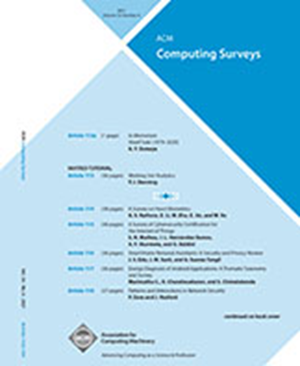Adversarial Patterns: Building Robust Android Malware Classifiers
IF 23.8
1区 计算机科学
Q1 COMPUTER SCIENCE, THEORY & METHODS
引用次数: 0
Abstract
Machine learning models are increasingly being adopted across various fields, such as medicine, business, autonomous vehicles, and cybersecurity, to analyze vast amounts of data, detect patterns, and make predictions or recommendations. In the field of cybersecurity, these models have made significant improvements in malware detection. However, despite their ability to understand complex patterns from unstructured data, these models are susceptible to adversarial attacks that perform slight modifications in malware samples, leading to misclassification from malignant to benign. Numerous defense approaches have been proposed to either detect such adversarial attacks or improve model robustness. These approaches have resulted in a multitude of attack and defense techniques and the emergence of a field known as ‘adversarial machine learning.’ In this survey paper, we provide a comprehensive review of adversarial machine learning in the context of Android malware classifiers. Android is the most widely used operating system globally and is an easy target for malicious agents. The paper first presents an extensive background on Android malware classifiers, followed by an examination of the latest advancements in adversarial attacks and defenses. Finally, the paper provides guidelines for designing robust malware classifiers and outlines research directions for the future.求助全文
约1分钟内获得全文
求助全文
来源期刊

ACM Computing Surveys
工程技术-计算机:理论方法
CiteScore
33.20
自引率
0.60%
发文量
372
审稿时长
12 months
期刊介绍:
ACM Computing Surveys is an academic journal that focuses on publishing surveys and tutorials on various areas of computing research and practice. The journal aims to provide comprehensive and easily understandable articles that guide readers through the literature and help them understand topics outside their specialties. In terms of impact, CSUR has a high reputation with a 2022 Impact Factor of 16.6. It is ranked 3rd out of 111 journals in the field of Computer Science Theory & Methods.
ACM Computing Surveys is indexed and abstracted in various services, including AI2 Semantic Scholar, Baidu, Clarivate/ISI: JCR, CNKI, DeepDyve, DTU, EBSCO: EDS/HOST, and IET Inspec, among others.
 求助内容:
求助内容: 应助结果提醒方式:
应助结果提醒方式:


